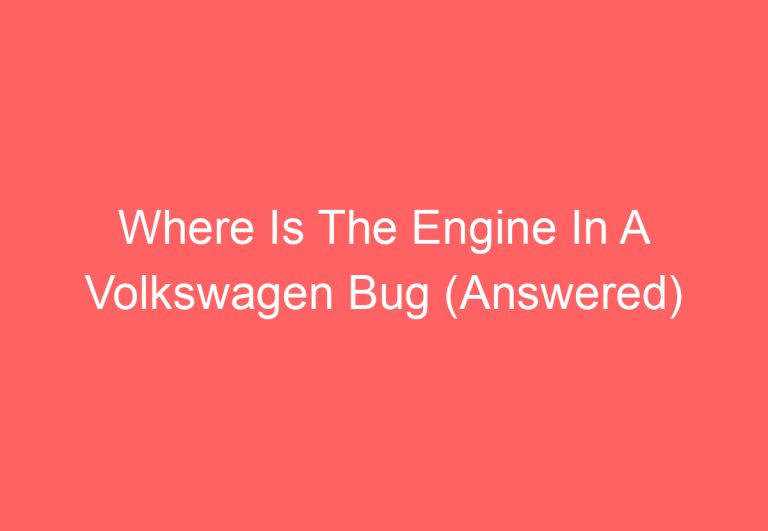Does Volkswagen Need Engine Flush (Get Answer)
Volkswagen engines are known for their reliability and longevity. But even the best engines need occasional maintenance to keep them running smoothly. One common question among Volkswagen owners is whether or not they need to have their engine flushed.
In this article, we’ll take a closer look at engine flushing and discuss whether or not it’s necessary for Volkswagen engines. We’ll also provide some tips on how to properly maintain your Volkswagen engine.
3 Signs Your Volkswagen Needs an Engine Flush
1. Engine knocking:
A knocking sound from your engine could be a sign that it’s time for a flush. This is because the buildup of sludge and other contaminants can cause the engine to work harder, which can lead to knocking.
2. Engine surging:
If your engine is surging, it could be another sign that it needs a flush. This is because the buildup of sludge and other contaminants can restrict the flow of fuel and air to the engine, which can cause it to surge.
3. Poor fuel economy:
If you’ve noticed a decrease in your fuel economy, it could be a sign that your engine needs a flush. This is because the buildup of sludge and other contaminants can reduce the efficiency of your engine, which can lead to decreased fuel economy.
Does Volkswagen Need Engine Flush?
What is an Engine Flush?
An engine flush is a chemical solution that is used to clean the inside of an engine. It can remove deposits of sludge, carbon, and other contaminants that can build up over time. This can help to improve engine performance and efficiency, and can also extend the life of your engine.
Do Volkswagens Need Engine Flushes?
All engines need to be flushed periodically, but the frequency will vary depending on the type of engine and the driving conditions. Volkswagen engines are generally considered to be relatively low-maintenance, and they typically do not need to be flushed as often as some other brands. However, if you drive in dusty or dirty conditions, or if you use your car for towing or other heavy-duty applications, you may need to flush your engine more often.
How to Perform an Engine Flush
Engine flushes are relatively easy to perform, but it is important to follow the manufacturer’s instructions carefully. The general steps involved are as follows:
1. Park your car on a level surface and allow the engine to cool down.
2. Remove the oil drain plug and drain the oil from the engine.
3. Add the engine flush solution to the oil filler neck.
4. Start the engine and let it run for the amount of time specified by the manufacturer.
5. Turn off the engine and allow the flush solution to drain out.
6. Refill the engine with new oil.
When Should You Not Perform an Engine Flush?
There are a few instances when you should not perform an engine flush. These include:
If the engine is overheating or has low oil pressure.
If the engine has been damaged or there is a leak.
If the engine is running rough or making strange noises.
In these cases, it is best to have the engine checked by a qualified mechanic before performing a flush.
Conclusion
Engine flushes can be a helpful way to keep your engine running smoothly, but it is important to use the right product and to follow the manufacturer’s instructions carefully. If you are unsure whether or not your Volkswagen needs an engine flush, it is best to consult with a qualified mechanic.
Also Read: Does Volkswagen Produce Non Diesel Engines

![2004 Volkswagen Jetta Engine Codes [Find Out]](https://volkswagenbuddy.com/wp-content/uploads/2024/05/2004-volkswagen-jetta-engine-codes-find-out_4211-768x531.jpg)
![2008 Volkswagen Passat Wagon Wvwlk73C38E134215 What Engine Code [Discovered]](https://volkswagenbuddy.com/wp-content/uploads/2024/05/2008-volkswagen-passat-wagon-wvwlk73c38e134215-what-engine-code-discovered_4219-768x531.jpg)
![2010 Volkswagen Jetta Engine Code [Answered]](https://volkswagenbuddy.com/wp-content/uploads/2024/05/2010-volkswagen-jetta-engine-code-answered_4225-768x531.jpg)


